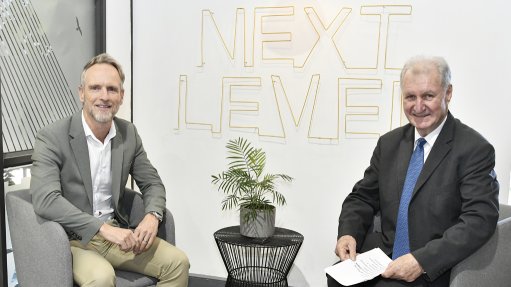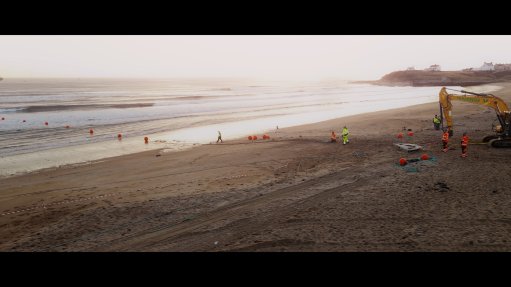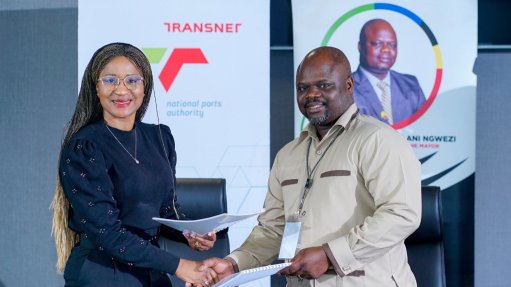Ford SA set to start Ranger mass production in October
Ford is starting to wrap up its R15.8-billion investment in its South African facilities to assemble the new Ranger pick-up, with mass production for the local and export markets scheduled to start in October.
The vehicle will be exported to more than 100 markets.
The first batch of tooling trial (TT) Rangers has already been produced at Ford South Africa’s (SA’s) Silverton plant, in Pretoria – an essential step in validating the new equipment and processes.
“We have been encouraged by the quality of the components and vehicles produced during this initial TT phase, which has justified the scale of our investment and the mammoth job it required in building completely new facilities, as well as revamping our entire assembly line while continuing to build the current Ranger,” says Ford SA operations VP Ockert Berry.
“We are about to commence with our preproduction runs in preparation for launch later this year.
“The Silverton assembly plant is virtually unrecognisable from 18 months ago, and this transformation has not only allowed us to introduce the latest technologies and quality control systems, but also gave us the opportunity to redesign the flow of the plant for maximum efficiency,” adds Berry.
“The result is a high-tech facility that compares with the best Ford plants in the world, and will enable us to deliver on the 200 000-unit installed capacity, which is the highest capacity ever for Ford in South Africa.”
Of the R15.8-billion investment, about R10.3-billion went directly into Ford’s operations, including the company’s first in-house stamping plant, a completely new body shop, and the total transformation of its trim, chassis and final line.
The latter has seen the introduction of a flexible new skillet system for vehicle assembly operations.
The vehicle is automatically raised or lowered based on the ideal height for the completion of the required tasks, and can be adjusted to suit the height of individual operators.
The skillet system is based on a moving conveyor platform, enabling the operators to move with the vehicle as it proceeds down the line, thereby improving working conditions, reducing cycle times and contributing to safety.
The plant also saw the installation of a new box line. This separates the vehicle cab and load compartment at the start of the assembly line for improved access and efficiency, before the two parts are rejoined and bolted to the chassis towards the end of the line.
“We have also built our own frame line in the Tshwane Automotive Special Economic Zone (TASEZ), adjacent to the plant, which is the only Ford-owned and -operated facility of its kind in the world,” adds Berry.
The frame line measures 100 000 m2, and features two manufacturing lines to produce the ladder-frame chassis for the new Ranger.
It incorporates an automation level of 95%, employing 585 robots, using a high-tech SKS intelligent welding system capable of manufacturing 15 chassis derivatives.
Measurements of all manufactured parts are conducted on the line, supported by a GOM ATOS ScanBox blue-light scanner system that creates a detailed three-dimensional model of the completed chassis.
Alongside the manufacturing area is a multistage e-coat facility where the frames are immersed in a range of cleaning and phosphate solutions, before being submerged in an electrically charged tank where the paint is uniformly bonded to the metal.
Thereafter, a robotic station applies a protective wax to provide rust protection and durability. Once completed, the finished chassis is delivered straight to the Ranger assembly line in the Silverton plant.
In addition to the significant investment in the Ford facilities, the US vehicle manufacturer also invested R5.5-billion in supplier tooling, with 14 of Ford’s component suppliers having set up operations in the TASEZ to support production of the Ranger.
In addition to the R15.8-billion investment in Ford’s Silverton operations, the company also invested R600-million in its Struandale engine plant, in Nelson Mandela Bay, for the launch of the new 3 ℓ V6 diesel engine, as well as upgrades to the existing assembly line for the 2 ℓ single-turbo and 2 ℓ bi-turbo diesel engines, all of which will be offered in the next-generation Ranger.
Solar Energy
Ford has made a commitment to use 100% carbon-free electricity across its manufacturing operations globally by 2035, and to achieve carbon neutrality by 2050.
The Silverton facility now receives 35% of its electricity directly from the sun, thanks to a long-term power purchase agreement with SolarAfrica that led to the installation of solar photovoltaic (PV) carports for 3 610 vehicles at the plant.
The large-scale array uses a total of 30 226 solar panels to generate 13.5 MW of emission-free electricity.
This makes it one of the largest solar carports in the world.
The solar PV array will eliminate the equivalent of 20 072 t of carbon dioxide a year.
Article Enquiry
Email Article
Save Article
Feedback
To advertise email advertising@creamermedia.co.za or click here
Comments
Press Office
Announcements
What's On
Subscribe to improve your user experience...
Option 1 (equivalent of R125 a month):
Receive a weekly copy of Creamer Media's Engineering News & Mining Weekly magazine
(print copy for those in South Africa and e-magazine for those outside of South Africa)
Receive daily email newsletters
Access to full search results
Access archive of magazine back copies
Access to Projects in Progress
Access to ONE Research Report of your choice in PDF format
Option 2 (equivalent of R375 a month):
All benefits from Option 1
PLUS
Access to Creamer Media's Research Channel Africa for ALL Research Reports, in PDF format, on various industrial and mining sectors
including Electricity; Water; Energy Transition; Hydrogen; Roads, Rail and Ports; Coal; Gold; Platinum; Battery Metals; etc.
Already a subscriber?
Forgotten your password?
Receive weekly copy of Creamer Media's Engineering News & Mining Weekly magazine (print copy for those in South Africa and e-magazine for those outside of South Africa)
➕
Recieve daily email newsletters
➕
Access to full search results
➕
Access archive of magazine back copies
➕
Access to Projects in Progress
➕
Access to ONE Research Report of your choice in PDF format
RESEARCH CHANNEL AFRICA
R4500 (equivalent of R375 a month)
SUBSCRIBEAll benefits from Option 1
➕
Access to Creamer Media's Research Channel Africa for ALL Research Reports on various industrial and mining sectors, in PDF format, including on:
Electricity
➕
Water
➕
Energy Transition
➕
Hydrogen
➕
Roads, Rail and Ports
➕
Coal
➕
Gold
➕
Platinum
➕
Battery Metals
➕
etc.
Receive all benefits from Option 1 or Option 2 delivered to numerous people at your company
➕
Multiple User names and Passwords for simultaneous log-ins
➕
Intranet integration access to all in your organisation


















